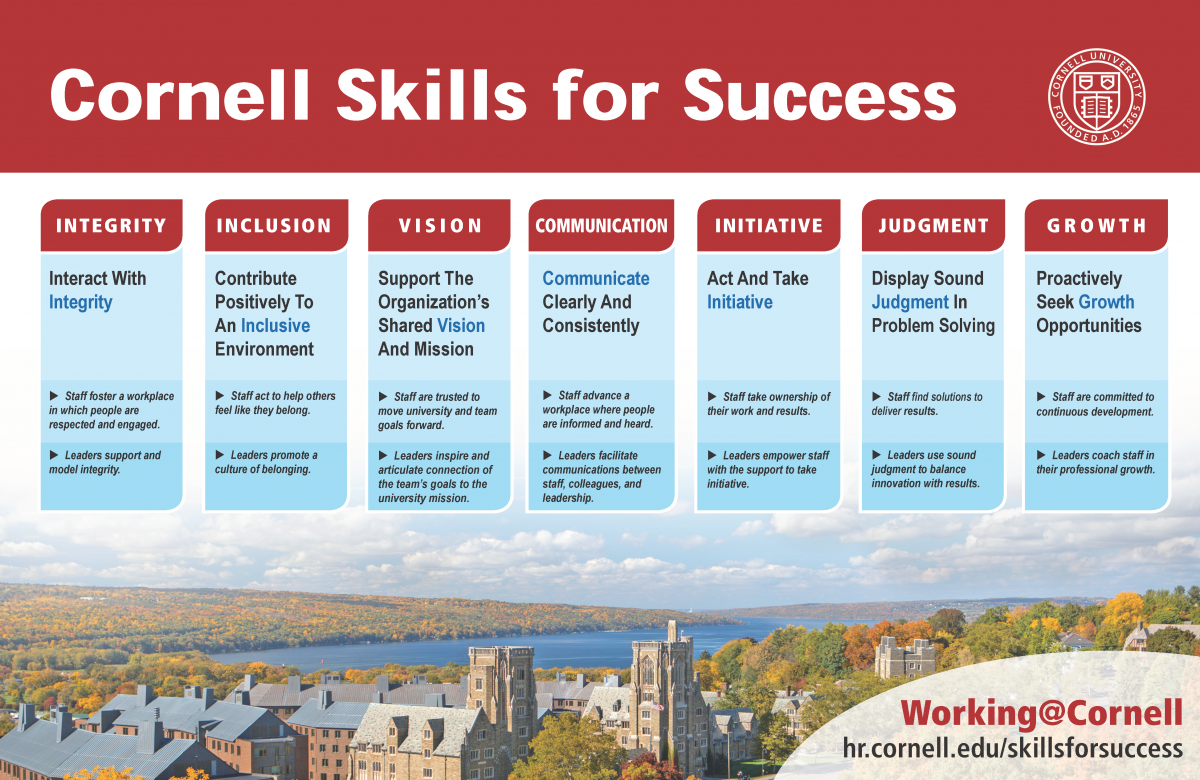Leadership Skills
At Cornell, there are a core set of Skills for Success that People Leaders can utilize to empower and inspire their team.
Integrity: Leaders support and model integrity.
People feel respected and engaged.
- Convey respect and professionalism in interactions.
- Seek to understand and then to be understood.
- Put others at ease, and respond calmly even in difficult situations.
- Be honest and trustworthy; have a high standard of personal conduct.
- Acknowledge your mistakes and errors, take timely corrective action, including an apology if appropriate.
- Demonstrate empathy and compassion for others.
- Give, ask for and act on feedback.
- Manage conflict, taking uncomfortable or unpopular action when necessary.
Inclusion: Leaders promote a culture of belonging.
People feel like they belong.
- Create an environment of trust.
- Demonstrate respect for all individuals.
- Actively invite new ideas, alternatives and perspectives.
- Integrate workplace flexibility as a part of a results oriented work culture.
- Speak up and take action if others are being excluded or treated inappropriately.
- Acknowledge the support and contributions of every person.
Vision: Leaders inspire and articulate connection of the team's goals to the university mission.
People know how their work aligns with university and team goals.
- Understand the University’s strategic goals and deliver aligned outcomes.
- Be adaptable, embrace, promote and implement change.
- Deliver results today with a sustainable future in mind.
- Demonstrate foresight and imagination to see possibilities, opportunities and trends.
- Model stewardship within the organization and University.
- Monitor and re-evaluate decisions, priorities and plans in order to achieve a vision.
Communication: Leaders facilitate communications between staff, colleagues and leadership.
People are informed and heard.
- Listen first.
- Share important information and decisions in a timely manner.
- Ensure people have a clear understanding of the expectations and desired result.
- Convey thoughts clearly, verbally and when writing.
- Adapt messaging to audience.
- Summarize other points of view to confirm understanding.
Initiative: Leaders empower staff with the support to take initiative.
People are supported and confident in taking ownership of their work and results.
- Encourage anticipatory thinking to identify challenges and opportunities early.
- Actively support others in taking initiative and responsible risks to innovate.
- Use mistakes as opportunities for learning.
- Balance the need to seek input and the need to take action.
- Provide clear directions and expectations that will enable others to make sound decisions.
- Deliver results on time and within budget.
Judgment: Leaders use sound judgment to balance innovation with results.
People proactively seek solutions to deliver results.
- Bring stakeholders together to create alignment, shared understanding and action.
- Ask insightful and probing questions.
- Use data and metrics to provide informed and thoughtful analyses.
- Consider impact on others outside your immediate area.
- Synthesize complex information.
- Anticipate obstacles and generate alternatives.
Growth: Leaders coach staff in their professional growth.
People understand their current role and career options.
- Make work challenging, meaningful and engaging for others.
- Identify and focus on the most significant priorities, setting achievable goals, milestones and deadlines.
- Provide others with productive and timely feedback.
- Delegate and provide good exposure for team members.
- Develop people and support their growth and mobility.

